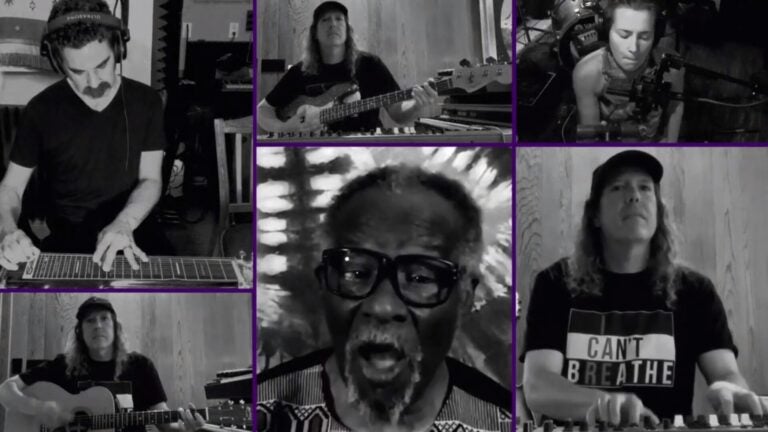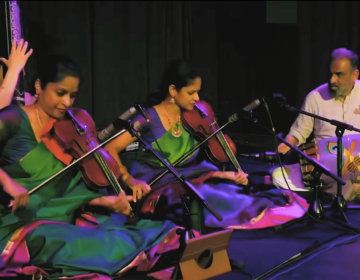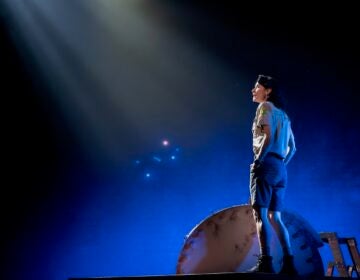Former Del. gov. reflects on Charlottesville rally by writing a protest song
Markell said he was inspired by the last words of activist Heather Heyer, who was murdered at the rally: “If you’re not outraged, you’re not paying attention.”
Listen 3:34
Musicians including Lester Chambers (bottom middle) of The Chambers Brothers perform the song "Charlottesville," written by former Delaware governor Jack Markell. (YouTube)
“Charlottesville, Virginia” were the first words Joe Biden used in his April 2019 video announcing his plans to run for president. “In that moment, I knew the threat to this nation was unlike any I had ever seen in my lifetime,” Biden said in the video.
The August 2017 white supremacist rally in Virginia inspired another Delaware politician in a very different way.
For former Delaware Gov. Jack Markell, who left office four years ago, the terrible events in Charlottesville were the catalyst not for a political campaign, but for a new venture in songwriting.
“It just really resonated with me and moved me, and I decided to try to write a song about that,” said Markell.
Three years ago last month, hundreds of white supremacists, neo-Nazis and other extremists gathered in Charlottesville. They marched with torches on Friday night, Aug. 11, 2017, chanting racist and anti-Semitic slogans including “Jews will not replace us.”
The following day, they were met by counter- protesters who opposed the racist march. One of those counter- protesters, 32-year-old Heather Heyer, was killed and 19 others were injured when a man deliberately drove his car into the group. The man is serving life in prison after pleading guilty to 29 of 30 hate crime charges.
“If in my own small way, I could write something that people think about, then it will have been worth it,” said Markell, who is Jewish.
Heyer’s last social media post included the quote, “If you’re not outraged, you’re not paying attention.”
That phrase became the hook for Markell’s song “Charlottesville.”
“I just think it’s so powerful,” he said.
After writing the lyrics, he worked with California songwriter Ann McNamee and others on setting those words to music.
“I took piano lessons for seven years as a kid, but I was not any good,” Markell said. “I can appreciate music, but figuring out what chords would not be a good use of anybody’s time.”
McNamee also helped put together a group of musicians to record the song, which is now available on Markell’s new YouTube channel.
Among those musicians is Lester Chambers, a member of the 1960s psychedelic soul group, The Chambers Brothers. On “Charlottesville,” Chambers plays harmonica and sings along with his son Dylan Chambers.
The younger Chambers said the events of Charlottesville served as a vivid example of the racism Black Americans have endured for centuries.
“It is actually awakening every spectrum of American life,” Dylan said in an online group discussion hosted by the artists also posted to Markell’s YouTube channel. “Everybody is realizing that the things we’ve been saying for 400 years are true.
“This is a moment for everybody to not go back to sleep. We have to keep pushing and fighting for the right kind of change,” he added. “It’s beautiful to share a song that hopefully will connect a lot of people to realizing that this has been going on for some time and we all have to change and be a part of that change.”
Markell’s songwriting effort came as a surprise to many people, though he’s long been interested in writing poetry. He said one of his friends told him, “Listening to a song that was written by you sounds about as exciting as listening to a song written by my accountant.’”
It’s a rare move for a former politician.
“I can’t think of another example,” said Philip Gentry, assistant professor of music at the University of Delaware. “I think it is wonderful for anyone to find a way to express themselves, even politicians.”
While governors-turned-songwriters are rare, there is a long history of political messaging through songs, most often in protest songs.
“Bob Dylan was taking Woody Guthrie as an example, and Markell is taking Bob Dylan as an example,” Gentry said. “They’re all sort of reaching for what seems like an authentic expression of average people’s musical taste to try to get across a political goal.”
Markell, who was born in 1960, says anti-war singer Phil Ochs was a big influence introduced to him by his siblings. He was also influenced by Joan Baez, who he met after a performance at The Grand in Wilmington a few years ago.
Markell’s offering comes as other Philadelphia-area musicians have also put out new protest music and compilations for the current moment of reckoning over systemic racism in America.
The former governor’s song isn’t exactly racing up the charts — it’s been viewed nearly 5,000 times since being posted on YouTube in mid-August, and has generated 5,600 views on Facebook plus another 11,000 impressions on Twitter— but that wasn’t Markell’s goal.
“I certainly didn’t write it to win a Grammy,” Markell said. “I certainly didn’t write it because I was going to make any money off of it, but I do think that music can be a very powerful force for change.”
While some protest songs aim to change minds, others function as what Gentry called cheerleading music.
“[It’s] for people that are part of your movement. How can you feel more together and perhaps energized in some ways?” Gentry said. “So, maybe it can have that effect on the people of his generation and culture might feel mobilized and energized.”
Markell acknowledged his song may not be for everyone.
“I’d say if you’ve been in politics for as long as I was in politics, you develop a pretty thick skin,” he said. “I feel like I created something I’m proud of and again, hopefully people will listen to it and it may resonate with them. So, I’m more than willing to put stuff out there and if people don’t like it, they don’t like it.”
While he doesn’t have plans to put together a full album, he plans to post another new song that focuses on civil rights on YouTube in a few weeks.

Get daily updates from WHYY News!
WHYY is your source for fact-based, in-depth journalism and information. As a nonprofit organization, we rely on financial support from readers like you. Please give today.





